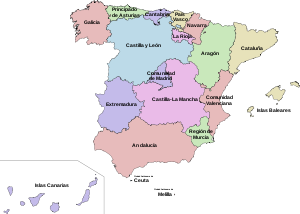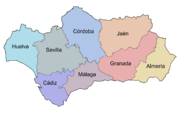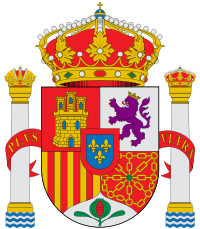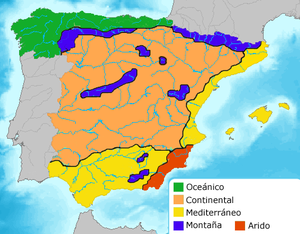Spain – informations (en)
GENERAL INFORMATION
Official name: Kingdom of Spain;
Government formation: Parliamentary Government under a Constitutional Monarchy;
Official language: Spanish;
Co-official languages: Catalan, Galician, Basque;
Capital (and largest city): Madrid;
Population: 46 157 822 (INE 2006);
Density: 91,4 inhabitants/km²;
Surface: 504 645 km2;
National Holiday: 12 October (”Día de la Hispanidad”);
Currency: EURO;
International code: +34;
Administrative divisions:
17 Autonomous communities: Andalucía, Aragón, Asturias, Balearic Islands, Canary Islands, Castilla-La Mancha, Castilla and León, Cataluña, Comunidad Valenciana, Extremadura, Galicia, La Rioja, Madrid, Murcia, Navarra, Basque Country (Euskadi) and two autonomous cities (Ceuta and Melilla) as well as three small islands (Chafarinas Islands, Peñón de Alhucemas y Peñón de Vélez de la Gomera), are managed directly by the Spanish Government.

The Spanish constitution: was adopted on 6 December 1978 and came into force on 29 December 1978.
Universal suffrage: for Spanish nationals reaching the age of 18 years. The foreign national with residence permit have the right to vote in local elections.
Executive System:
- The Head of State: King Don Juan Carlos I
- Crown Prince: The Prince of Asturias, Felipe de Borbón
- Head of Government: Prime Minister José Luis Rodríguez Zapatero
- First Vice President: María Teresa Fernández de la Vega
- Second Vice President and Minister of Economy and Finance; Elena Salgado Méndez
- Cabinet: Council of Ministers appointed by the President
- Council of State is the supreme advisory body.
The legislative system is bicameral: the Parliament consisting of the Senate (259 seats) and the Congress of Deputies (350 seats), whose mandate is of 4 years.
GEOGRAPHY AND CLIMATE
Spain is located in Western Europe, occupying most of the Iberian Peninsula and beyond, two archipelagos (the Canary Islands in the Atlantic Ocean and the Balearic Islands in the Mediterranean Sea) and two cities (Ceuta and Melilla in North Africa), besides several smaller islands in this area and others near the peninsula. It lies between Europe and Africa and two areas of influence, the mediterranean and Atlantic.
There are many climates In the Iberian Peninsula as a result of the terrain and costs alignment, reason why we can often speak about local microclimates.
DEMOGRAPHY
In 2008 the population of Spain officially reached the 46 157 822 inhabitants, according to the National Statistics Institute (INE). This is the fifth most populated country in the European Union; however, as we have stated before, its density (91,4 inhabitants / km ² – INE 2008) is lower than in the average of the Western European countries.
FOREIGN NATIONALS
According to the National Statistical Office (INE) in 2008, 5 268 726 people, or 11.41% of Spain’s population is of foreign nationality. The large-scale immigration began approximately in the mid-nineties. Since 2000, Spain has received the second highest number of immigrants from around the world in absolute terms (after USA). Spain is the tenth country with the largest foreign population, behind countries such as USA, Russia, Germany, France, Canada or the UK. Most immigrants arriving in Spain come from Latin America (by 36.21%), followed by Western Europe (21.06%), Eastern Europe (17.75%) and the Maghreb (14.76%) The foreign population from Romania exceeds 700 000.
The geographical distribution of foreigners is very irregular, concentrated along the Mediterranean coast and the Canary Islands, Madrid and surroundings, generally accentuating further the already deep regional differences in population.
ENTRANCE INTO THE SPANISH TERRITORY
The entry into Spanish territory for European Union citizens shall be done with a valid passport or identity card stating the holder’s nationality.
With the accession to the EU as full members of Romania and Bulgaria, their citizens have equal rights as the rest of the EU Member States to enter Spain, for employment, study or residence purposes.
The requirements for remaining in the Spanish territory will depend on the duration of the stay. For a stay shorter than three months, the possession of a passport or identity card is sufficient. If the stay exceeds three months, interested parties are obliged to apply personally to the Immigration Office of the province where the stay or to the Police Station, to register in the Central Registry for Foreigners. The deadline to complete this process is three months from the date of entry into Spain.
For more information, please consult:
http://www.mir.es/SGACAVT/extranje/ciudadanos_UE/estancia_residencia.html
ANDALUCÍA 

Andalusia is a Spanish region, constituted as an autonomous community with historic national recognition, comprising the provinces of Almeria, Cadiz, Cordoba, Granada, Huelva, Jaen, Malaga and Seville. Its capital is Seville, recognized by the Statute of Autonomy where are located the headquarters of the Autonomous Community. The seat of the Superior Court of the autonomous community is located in the city of Granada.
 It is the most populated autonomous community of Spain (8 285 692 inhabitants in 2009) and the second largest, which explains its weight in Spain. Andalucía is located in the south of the Iberian Peninsula, bordered by the Republic of Portugal (West), Atlantic Ocean, the Mediterranean and the British overseas territory Gibraltar (South), by Extremadura (North) and Castilla-La Mancha as well as Murcia (East).
It is the most populated autonomous community of Spain (8 285 692 inhabitants in 2009) and the second largest, which explains its weight in Spain. Andalucía is located in the south of the Iberian Peninsula, bordered by the Republic of Portugal (West), Atlantic Ocean, the Mediterranean and the British overseas territory Gibraltar (South), by Extremadura (North) and Castilla-La Mancha as well as Murcia (East).
In 1981, Andalucía was recognised as an independent community, under the provisions of the article two of the Spanish Constitution (1978), which recognizes and guarantees the right to autonomy of Spanish regions and nationalities.
Capital (and largest city): Seville;
Official language: Spanish;
Entity: Autonomous region;
President: José Antonio Griñán;
National Holiday: February 28th;
Total Population: 8 202 220 inhabitants;
Foreign Population: 632 279 (7,6%);
Foreign national coming from Rumania: 79 630 (is the third largest immigrant community behind the United Kingdom and Morocco.)
IMPORTANT TELEPHONE NUMBERS
- Emergencies (multilingual operators): 112
- Fire Service: 080
- Police – Emergency Services: 091
- Emergencies and traffic accidents: 088
- Medical Emergency: 061
- Red Cross Phone: + 34 91 335 4444 / 335 4545. It works as a national ambulance service
- Chemical 24h Phone: 098
- Information Non-urgent health: +34 902 106 102
IMPORTANT ADDRESSES
Embassy of România

Address: Avenida de Alfonso XIII nr. 157, Madrid 28016, Spain
Tel: (+34) 91.350.1881
Fax: (+34) 91.345.2917
E-mail: [email protected]
Website: http://madrid.mae.ro/
The Consulate General of Romania in Barcelona
Address: C / San Juan de la Salle 35a (08022), Barcelona
Admission: Alcoy 22
Tel: (+34-93) 4341108, 4341139
Fax: (+34-93) 4341109
E-mail: [email protected]
Honorary Consulate of Romania in Valencia
Address: .C / Colon 9, Pta. 15 46004-Valencia
Tel: +34 963 53 50 50, Fax: +34 963 94 40 44
E-mail: [email protected]
WEB SITES OF INTEREST:
Ministry of Labour and Immigration: http://www.mtas.es
Ministry of Interior: http://www.mir.es
Ministry of Health and Social Policy: http://www.msps.es
Blog of the Romanian community in Spain: www.rumanos.com.es
Federation of Romanian Immigrants in Spain: http://fedrom.org


